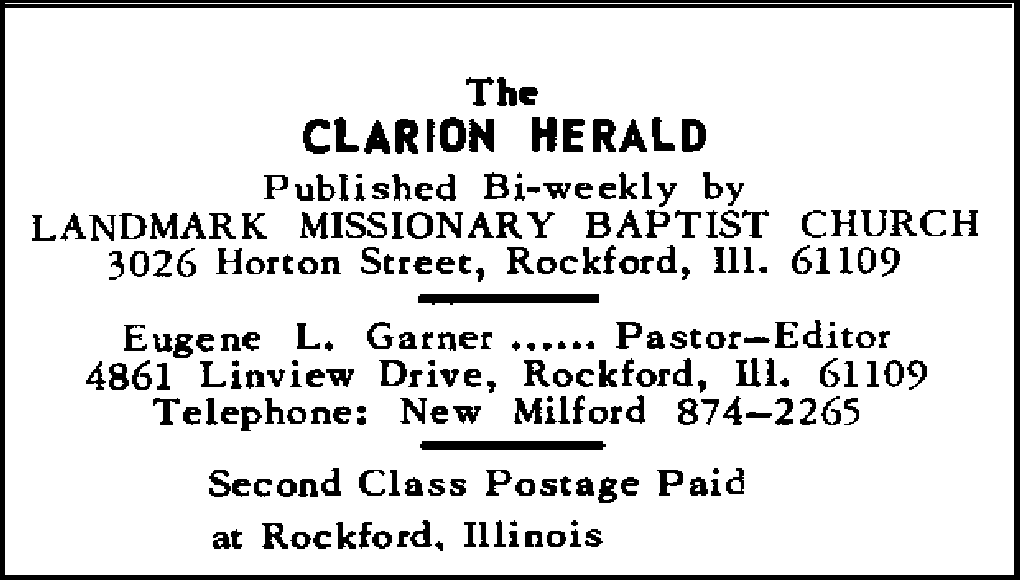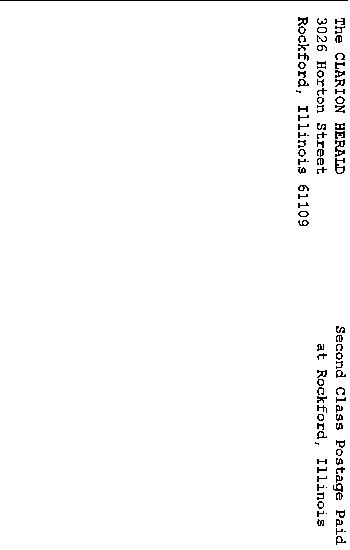
|
 |
 |
 |
|
 
|
|
|
MARKS OF A SPIRITUAL MAN
It is not enough for a person to claim, assume or "feel" that he is "spiritual". The Word of God gives such marks of spirituality as to prevent any honest soul from imagining himself to have "arrived".
One who is truly spiritual manifests it in his diet; he feeds on spiritual food, (I Cor. 10:3-4). He hungers after the "bread of God", (John 6:40-54). He is deeply concerned for the will of God:, (John 4:32-34); the truth of God, (Heb. 5:12-14; Matt. 4:4); and the things of God, (I Cor. 3:1-2).
The spiritual man exercises such spiritual gifts as have been divinely bestowed upon him, (I Cor. 12:1; 14:1). He realizes that such gifts are bestowed -- NOT for his own honor, but for the maturing of God's people, (Rom. 1:11). And he zealously and faithfully exercises such gifts as he has received for the edification of the body of Christ of which he is himself a member, (I Cor. 14:12; 12:11; Eph. 4:7-8; I Pet. 4:10-11; Eph. 4:12-13).
While fully appreciating God's provision, the spiritual man does not become so engrossed in the GIFT as to forget the Giver, (Eph. 1:1-
|
|
|
|
14). He does all for the glory of God. He sings spiritual songs, (Eph. 5:18-19; Col. 3:16); Sows spiritual things, (Rom. 15:27; I Cor. 9:11; Gal. 6:8); and resists spiritual foes, (Eph. 6:12).
Spiritual men are so identified with Christ as to be part of a spiritual "house" (I Pet. 2:5) wherein they may offer up spiritual sacrifices. This involves something inward, (Hos. 6.6). It requires brokenness of spirit, (Psalm 5:17); praise, (Heb. 13:15-16); and the surrender of all that one is and possesses to the mastery of Jesus Christ, (Rom. 12:1-2).
Finally, he who is spiritual awaits an ultimate "regeneration", or "begetting" from the dead wherein he will be raised in the glorious likeness of his dear Lord, (Psa. 2:7; Acts 13:33; Matt. 19:27-29; I Cor. 15:44-46; Rom. 8:23; Eph. 4:30; 1 Cor. 15:51; I John 3:1-3).
If any man thinks himself to be spiritual, let him acknowledge that a consistent interpretation of God's Word will stand in the day of judgment -- whether he approves or not. In fact, spirituality is contrasted with ignorance and a disorderly regard for the divine commandments, (I Cor. 14:37-40).
-- Eugene I. Garner
|
|
|
|
|
Page - 2
THE SPIRIT & THE LETTER
That the Holy Spirit was not given to obscure the Christ, but to exalt Him, is easily observed in Paul's teaching and experience,
(2 Cor. 3:6-18). One may seek the Spirit just to have the Spirit, or for the sake of "power", when He is not available except for Jesus' sake. Whoever seeks the Spirit that he may USE the Spirit will seek in vain; but whoever desires the Spirit that he may be used of the Spirit will surely not seek in vain.
The contrast between the "spirit and the letter" was a favorite one with the apostle Paul. True circumcision is that "of the heart, in the spirit and not in the letter", (Rom. 2:29). We are to serve God "in newness of spirit, and not in oldness of the letter", (Rom. 7:6); Setting the spiritual against the literal, Paul was able to see the spiritual -- even in the law,(I Cor. 10:3-4; Romans 7:14). But he used
|
|
|
|
his contrasts with good common sense, (I Cor. 14:1-19). He would rather speak five words with the understanding -- instructing others -- than ten thousand words in a tongue which might indeed be spiritual, but literally meaningless. His gospel was proclaimed in warm, plain, stinging words, because it was also proclaimed "in the Holy Ghost", (I Thes. 1:5).
When Paul contrasted spirit and letter he was drawing a contrast between REALITY and mere form. If reality can do without the form he sees no reason why it should not do so, But form without reality would be utterly worthless. Men have a tendency to concentrate all their attention on the "letter" -- the form or shell, while the spirit is far more important than finesse and form. Even true words, spoken without the Spirit, are nothing more than physical vibrations. But, if energized by the Spirit they are powerful -- bringing glory to God and blessing to men.
May our lives, therefore, be more fully yielded to the Spirit -- that they may more effectively show forth the praises of Him who has called us out of darkness into His marvelous light! E.G.
PERFECT TIMING
God's help is always sure
His methods seldom guessed;
Delay will make our pleasure pure,
Surprise will give it zest.
His wisdom is sublime,
His heart profoundly kind;
God never is before His time,
And never is behind.
-- Anonymous
|
|
|
|
|
THE IMPORTANCE OF RIGHT DECISIONS
(Ruth 1 -- Continued)
Following the death of her two sons, Naomi made a wise decision to return to Bethlehem. She had no means of support in Moab; besides, it was a land filled with sad memories. Bethlehem was her home. There she would find love, sympathy and the sanctuary of her God. She accepted the death of her loved ones as a mark of God's displeasure of their leaving the covenant land.
In her decision to leave Moab Naomi manifested an unselfish concern for the happiness of her daughters-in-law. She had always had a beautiful relationship with them; thus, she asks the blessing of Jehovah upon them as she prepares to leave them to return to their mother's houses. There they would find sympathy and help. It was her earnest desire that each of them might find "rest" in the house of her own husband. And as a gesture of her deep love, she kissed them and bade them farewell.
But both of the young women affirmed their willingness to return with Naomi to her own country and people. Arguing against the wisdom of such a thing, Naomi told them that since she was not pregnant with sons she could not provide husbands for them, (Deut. 25:5; Gen. 38:8; Matt. 22:23-32). She considered herself too old to have a husband. Even if she could bear children, they probably would not want to wait that long for husbands. It was not that Naomi wanted to be rid of her daughters-in-law; it would deeply grieve her to part from them.
|
|
|
|
But the hand of the Lord seemed to be lifted against her. She felt that their prospect for a normal, happy life would be better served if they stayed with their own people. So, once more, she embraced them and wept.
Orpah then returned to her mother's house -- where she was reasonably sure of finding refuge and a good home. But, with deep love for Naomi, and an admirable faith in Naomi's God, Ruth made a beautiful decision -- one with far-reaching consequences. Ruth, by her marriage to Mahlon, had left everything to cast her lot with his people. Adversity or not, her heart was, irrevocably knit to that of Naomi. The record of her decision is stated in what are probably the most beautiful and eloquent words of the entire Bible.
"Entreat me not to leave thee, or to return from following after thee: for whither thou goest I will go; and where thou lodgest, I will lodge: thy people shall be my people, and thy God my God: Where thou diest, will I die, and there will I be buried: the LORD do so to me, and more also, if ought but death part thee and me".
Having counted the cost, Ruth is ready to suffer the loss of all else for Naomi, and the God whom Naomi has taught her to love. She can teach us an important lesson. As it was necessary for her to forsake Moab, so, we must die to the old way of life before we can truly walk in "newness of life" in Christ. Fidelity is the mark of a loving heart. So, we might well ask ourselves whether we are as determined
|
|
|
|
|
to follow Christ as Ruth was to follow Naomi, (Lk. 9:23; 57-62; 14:25-33).
It was a chastened Naomi that returned, with her daughter-in-law, to Bethlehem. And this reminds us that an humbled and repentant nation will be restored to the covenant land at the return of our Lord. It also suggests something of the child of God who, today, turns away from serving the Lord. Under the chastening hand of God, who loves him, the child of God is turned back into paths of acceptable service -- in bitterness of soul and the brokenness of repentance.
The women of Bethlehem were visibly moved by Naomi's humble return. What a difference 10 years had made "Is THIS Naomi?" they inquired. And
|
|
|
|
she answered: "call me not Naomi (pleasantness), call me Mara (bitterness): for the Almighty hath dealt very bitterly with me. I went out full, and the Lord hath brought me home again empty: Why then call ye me Naomi, seeing the Lord hath testified against me, and the Almighty hath afflicted me?"
It is admirable that Naomi makes no attempt to conceal her real condition when she returns to her native home. It is not unusual for the natural man, even when a beggar, to desire to SHINE. But Naomi had lost everything; what she had gained in the companionship of Ruth was not yet able to console her. Her very love fills her with anxiety for Ruth. But it is evident, even in her misery, that she has found the grace of God; and even in her sorrow she is lovely.
Naomi had not gone to Moab of her own accord, she had followed her husband there. Her stay was prolonged by the marriage of her sons. After their deaths she returned to her own land, though she had little to hope for. And yet, in the judgment she perceived only her own guilt! Her loving heart takes all God's judgment on itself. The more she loved, the more ready she was to repent. And, being Naomi she did not accuse those she loved.
One sign of true love is unselfishness, which ascribes ills to self and blessings to others. As long as she was in misery, Naomi took the anger of God upon herself; but as soon as she perceived the favor of God, she praised Him as the God who showed kindness to "the living and the dead".
|
|
|
|
|
 |
 |
 |
|




